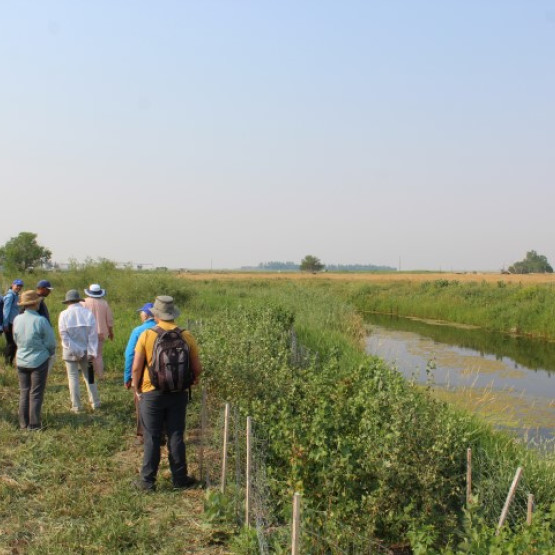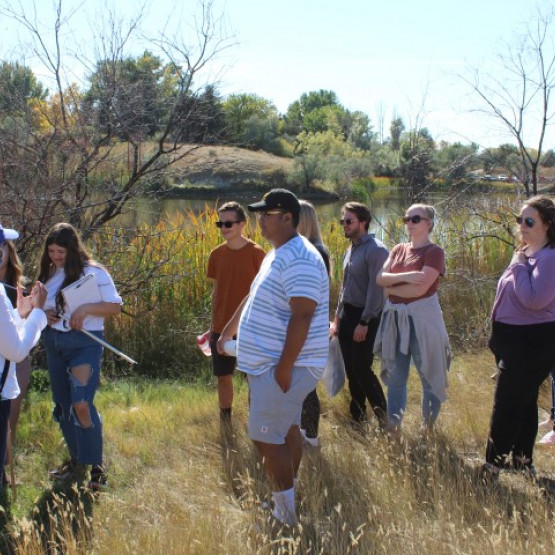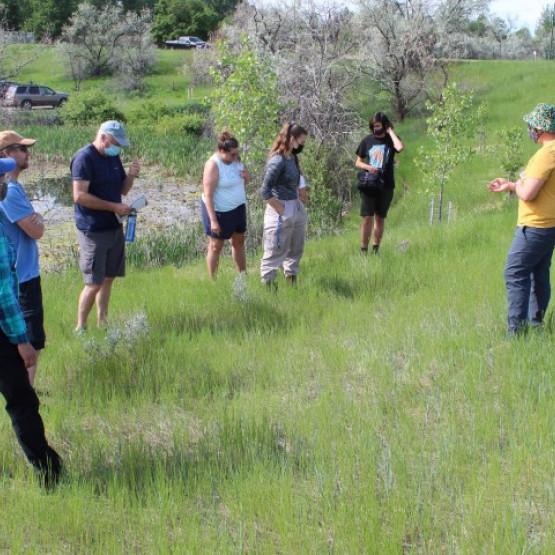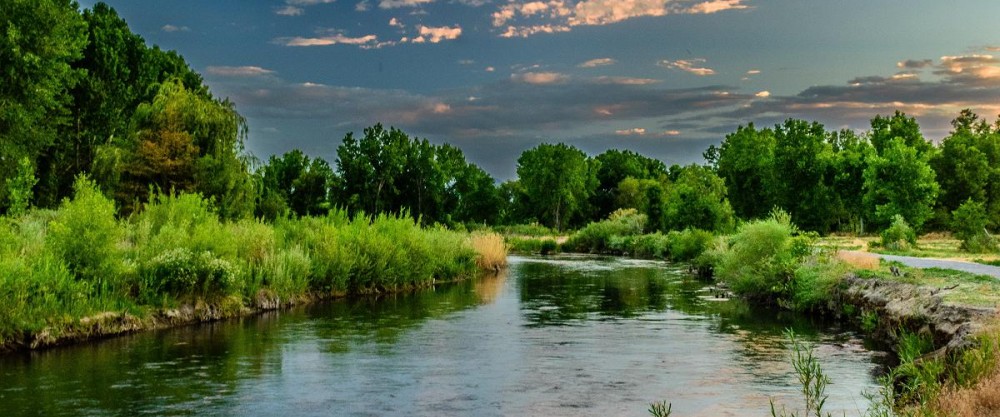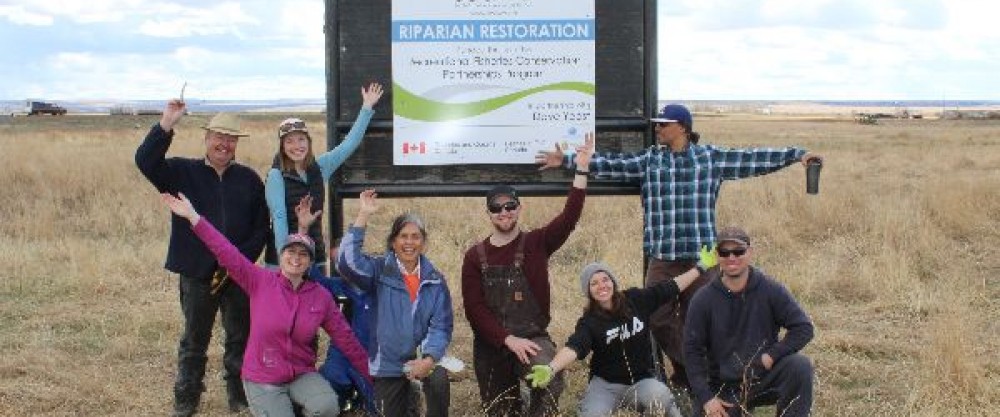SEAWA thrives on the efforts, knowledge, and interest of its stakeholders - all of us who live, work, and play in the SEAWA watershed. Together we build and strengthen relationships among different sectors - economic, social, and environmental. We educate, provide information, and promote awareness about watershed health. We create interest among stakeholders to join and/or support SEAWA in these various activities. Together, we find solutions to watershed issues we identified. A healthy watershed is essential to human health and well-being.

SEAWA's community engagement activities tie directly in to our ability to expand our knowledge of the watershed. By getting the community involved in our stewardship work, we are able to learn and do more. Learn about SEAWA model for community engagement below:
The SEAWA Model: A Circular Pathway to Community Action
Stewardship and applied research projects have proven to be effective educational tools (demonstration sites), credible sources of new and directly relevant water and watershed knowledge to educate stakeholders about and effective means of promoting SEAWA and motivating people to volunteer for SEAWA and its initiatives.
Education leads to awareness, which in turn leads to action. One cares about what one understands. This applies to actions on watershed stewardship -- water, land, air, ecosystems, and overall biodiversity. Stewardship actions bring people together to share knowledge and resources and to join or support not-for-profit organizations such as SEAWA.
Watch SEAWA's video recognizing and promoting the importance of partnerships with landowners for riparian restoration projects:
To receive announcements for upcoming SEAWA events, click here and subscribe to our mailing list!
Environmental Protection Agency Warning (by Ella Mfene)

The Impact of Polluted Water
Water pollution occurs when harmful substances—ranging from industrial chemicals to agricultural runoff—enter natural water systems. This contamination can devastate ecosystems, kill aquatic life, and make water unsafe for human consumption. Sources of these pollutants include:
• Oil spills: These create toxic conditions for marine life and are notoriously difficult to clean.
• Chemical runoff: Fertilizers, pesticides, and industrial waste contribute harmful chemicals to water sources.
• Sediment and dirt: Construction and deforestation can lead to increased sediment in waterways, disrupting habitats and water clarity.
• Toxic substances like PFAS: Found in everyday products such as nonstick cookware, firefighting foam, and water-resistant fabrics, these chemicals accumulate in the environment and in human bodies over time.
PFAS Contamination: A Growing Crisis
According to the Environmental Protection Agency (EPA), over 70 million Americans rely on water systems that have detectable levels of PFAS at concentrations high enough to warrant reporting. PFAS contamination poses serious health risks, including:
• Cancer: Long-term exposure has been linked to certain cancers.
• Reproductive issues: PFAS can interfere with hormonal systems, affecting fertility.
• Immune system suppression: These chemicals may reduce the effectiveness of vaccines and increase susceptibility to infections.
Protecting Our Water
Addressing water pollution requires a multifaceted approach, including regulation, innovation, and community action:
1. Stronger regulations: Governments must enforce strict limits on industrial discharges and agricultural runoff. Recent EPA proposals to lower allowable PFAS levels are a step in the right direction.
2. Improved technology: Advancements in water treatment, such as reverse osmosis and activated carbon filtration, can help remove contaminants.
3. Public awareness: Communities must be informed about the dangers of water pollution and how to reduce their impact, such as properly disposing of chemicals and minimizing the use of PFAS-containing products.
4. Restoration efforts: Rehabilitating polluted waterways through cleanup initiatives and replanting vegetation along riverbanks can help restore ecosystems and improve water quality.
Protecting our water systems requires urgent action from policymakers, industries, and individuals alike. By recognizing the importance of clean water and committing to its preservation, we can ensure a healthier, more sustainable future for all.
For more information on water quality and PFAS contamination, visit the links below.
https://www.consumernotice.org/environmental/water-contamination/pfas/
https://www.consumernotice.org/environmental/water-contamination/pfas/health-effects/
Adopt-a-Pond or Path Initiative
What better way to celebrate nature than to take a walk around one of the many ponds in and around Medicine Hat and area ... and perhaps adopt one of them! Those who adopt a pond agree to do four simple actions:
- Walk around the pond every week or two and give it some love (hum a tune, meditate, write a poem, sing, dance, do chi gong, paint a picture... (whatever gives you and the pond joy!)
- Pick up the trash.
- Report invasive plants on the EDDMaps (Alberta) app (we will help with that).
- Invite one or two others to do the same.
This initiative was started as a result of the COVID-19 restrictions that closed all indoor educational activities and large gatherings. It allowed outdoor education to continue through individual or family participation, and communication with each other was through emails. The first pond was adopted on March 8, 2021. Led by Martha Munz Gue, the official launch of the Adopt-a-Pond initiative was at SEAWA's World Water Day cleanup event at Connaught Pond, Medicine Hat, on March 20, 2021. By the following year, all of the ponds in the City of Medicine Hat had been adopted, and these places are now free of trash. The initiative has expanded to Adopt-a-Path along the Seven Persons Creek and the South Saskatchewan River, and in 2023, to the Town of Redcliff. This initiative is a collaboration between Grasslands Naturalists and SEAWA. A big thank you to all volunteers!
Educational & Volunteer Events
Annual events are celebrated
with volunteers, such as: World Water Day, Earth Day, Environment Week, World
Rivers Day, and more. SEAWA organizes shoreline clean-up, invasive species
removal, and wildflower appreciation walk events. SEAWA also participates with
the activities of partner organizations.as well as community festivals. Field
tours are also part of SEAWA's educational activities, and serve to strengthen
the knowledge shared through its publications.
At community events, SEAWA has booths filled with educational materials, project information, natural specimens, and games for children.
2022 - 2023
2021 - 2022
Urban Pollinator Garden
In the summer of 2020, SEAWA summer staff planted a pollinator garden with native prairie wildflowers in an attempt to attract more pollinators and help beautify downtown Medicine Hat. There has been a growing concern about the declining bee population in North America and planting bee-friendly garden is encouraged. In the fall we expanded the garden and planted native prairie wildflowers collected by SEAWA staff and board members. We seeded milkweed, golden and white asters, blazing star, sunflower, Gaillardia, yarrow, coneflower, beardtongue, sneezeweed, brown-eyed Susan, Canada goldenrod, and many more.
The garden is located by the sidewalk of Macleod Trail at the corner of 4th St SE. We are looking forward to a beautiful flowerbed hosting bees. This initiative is in partnership with the owner of the Arcade Plaza building where the SEAWA office is located.
Publications
SEAWA's educational publications are accessible here, as well as project reports, experiment results, and useful resources from other sources.
Educational Forums
Normally, SEAWA holds educational forums twice a year; in spring and fall. Announcements for upcoming educational forums are distributed through our mailing list. Presentations from previous forums are available here!

For Kids!
Here are some educational resources for children and youth:
- https://www.praxismedhat.com/
- https://www.natureline.info/
- https://albertawater.com/
- https://albertawater.com/resources
- https://albertawater.com/follow-the-drop-landing-page
- https://albertawater.com/nexus-video-series
Networking Events
SEAWA staff and members participate in conferences, workshops, summits, forums, webinars, and consultations to share knowledge, provide feedback and learn about water, watersheds, and environmental sustainability.
Social Media
SEAWA regularly provides updates of its activities and shares water, watershed, and environmental sustainability knowledge and news through social media using Facebook and Twitter. Follow us!
- Facebook: https://www.facebook.com/SEAWAlliance
- Twitter: https://twitter.com/SEAlbertawaters
Recognition
SEAWA was a recipient of the City of Medicine Hat's Community Spirit Award in 2019.

















